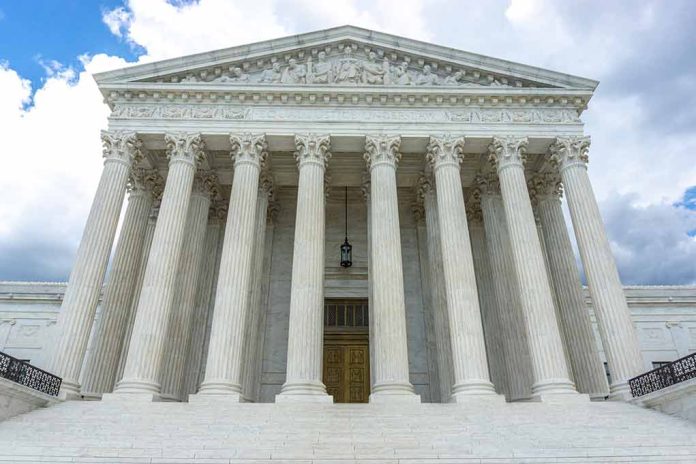
President Trump’s deportation efforts face judicial obstruction as the administration petitions the Supreme Court to override a lower court order preventing quick removal of criminal migrants to third countries.
Key Takeaways
- The Trump administration has asked the Supreme Court to lift an injunction blocking rapid deportation of illegal immigrants to third countries.
- U.S. District Judge Brian Murphy required the administration to provide migrants with a “meaningful opportunity” to contest deportations to countries where they may face persecution.
- Several migrants are currently held at a military base in Djibouti awaiting “reasonable fear” interviews after being sent toward South Sudan.
- President Trump criticized the judicial intervention as “absolutely out of control” and harmful to America’s security interests.
- The administration argues that judicial procedures are “wreaking havoc” on immigration enforcement and disrupting sensitive diplomatic relations.
Trump Administration’s Supreme Court Appeal
The Trump administration has escalated its battle to enforce immigration law by petitioning the Supreme Court to lift a lower court order that prevents the rapid deportation of illegal immigrants to third countries. Solicitor General D. John Sauer submitted the emergency request, arguing that the restrictions imposed by U.S. District Judge Brian Murphy’s injunction are severely hampering the administration’s immigration enforcement efforts and creating diplomatic complications. The administration is seeking immediate relief to continue deportations without the procedural delays imposed by the court.
“Those judicially created procedures are currently wreaking havoc on the third-country removal process. In addition to usurping the Executive’s authority over immigration policy, the injunction disrupts sensitive diplomatic, foreign-policy, and national-security efforts,” stated Solicitor General D. John Sauer.
Judicial Roadblocks to Immigration Enforcement
Judge Murphy’s injunction requires the government to provide migrants with a “meaningful opportunity” to raise concerns about potential torture, persecution, or death before being deported to third countries. The judge specified that immigrants should have at least 10 days to present their claims, finding that federal immigration officials likely violated due process by removing migrants without notice or opportunity to be heard. This has created a significant obstacle for the Trump administration’s broader strategy to manage the border crisis by establishing deportation agreements with multiple countries.
“Plaintiffs are simply asking to be told they are going to be deported to a new country before they are taken to such a country, and be given an opportunity to explain why such a deportation will likely result in their persecution, torture, and/or death,” wrote Judge Murphy in his ruling.
The administration has approached several countries including Libya, Rwanda, and Costa Rica to accept non-citizen migrants as part of its deportation strategy. Reports indicate over 200 Venezuelans have already been sent to El Salvador and detained at the Terrorism Confinement Center. The case before the Supreme Court specifically involves migrants from countries like Vietnam and Myanmar who were allegedly ordered deported to South Sudan, despite human rights concerns in that nation.
The Djibouti Standoff
A significant flashpoint in this legal battle involves migrants currently stranded in Djibouti. After the administration placed eight migrants with criminal records on a flight to South Sudan, Judge Murphy determined this violated his court order and directed U.S. officials to conduct “reasonable fear” interviews for six deportees, allowing them legal representation. The migrants are now being held at a military facility in Djibouti awaiting these interviews, creating what the administration describes as a diplomatic predicament with potential foreign policy implications.
“the United States has been put to the intolerable choice of holding these aliens for additional proceedings at a military facility on foreign soil — where each day of their continued confinement risks grave harm to American foreign policy — or bringing these convicted criminals back to America,” argued Solicitor General Sauer in the Supreme Court filing.
The Trump administration is seeking Supreme Court intervention to permit rapid deportation of undocumented immigrants to countries other than their home nations, according to Fox News.
This follows a nationwide injunction by lower-court Judge Brian Murphy, which blocked the…
— Breanna Morello (@BreannaMorello) May 27, 2025
President Trump’s Response
President Trump has vocally criticized the judicial intervention in his immigration policies, calling the judges “absolutely out of control” and urging the Supreme Court to intervene quickly. His administration maintains that these judicial roadblocks are undermining critical efforts to secure the border and protect American citizens from criminal illegal immigrants. The President has emphasized the urgency of resolving this matter, warning of potential consequences if deportation efforts continue to be obstructed.
“The Judges are absolutely out of control, they’re hurting our Country, and they know nothing about particular situations, or what they are doing – And this must change, IMMEDIATELY! Hopefully, the Supreme Court of the United States will put an END to the quagmire that has been caused by the Radical Left,” stated President Donald Trump.
The case highlights the ongoing tension between executive authority on immigration and the judiciary’s role in ensuring due process. While the administration argues for efficient enforcement mechanisms to address the border crisis, Judge Murphy has insisted on maintaining basic procedural protections, even noting that “having immigration proceedings on another continent is harder and more logistically cumbersome than Defendants anticipated.” The Supreme Court’s decision will have significant implications for the administration’s broader immigration strategy.



